Cancer affects so many of us today, either directly or indirectly. Let's unpack what it is and how one young person is tackling this head-on...
What is cancer?
Cancer is a disease and occurs when bad cells stop the good cells from doing their job. These bad cells can grow into a lump and can spread to other parts of the body. Cancer is the name for over 200 diseases in which abnormal cells grow and rapidly divide. These cells usually develop into a lump called a tumour.
How is cancer treated?
Every diagnosis is treated differently considering many factors; the type of cancer, where it is, how big it is, whether it has spread, age of the patient, family history and general health. When diagnosed, a stage of cancer will be given. Staging is a way of describing the size and how far it's grown and often includes the grade. The grade is how the cancer cells look under a microscope, the more abnormal they look, the higher the grade. There are four stages used; stage 1 often means that the cancer is small and still within the area where it started. Stage 2 usually means that the tumour is larger than in stage 1, but the cancer hasn't begun to spread into the surrounding areas. Stage 3 means the tumour is larger meaning it may have spread into surrounding tissues and that cancer cells are in nearby lymph nodes. Stage 4 means the cancer has spread from where it started to another body organ and is then labelled 'terminal.'
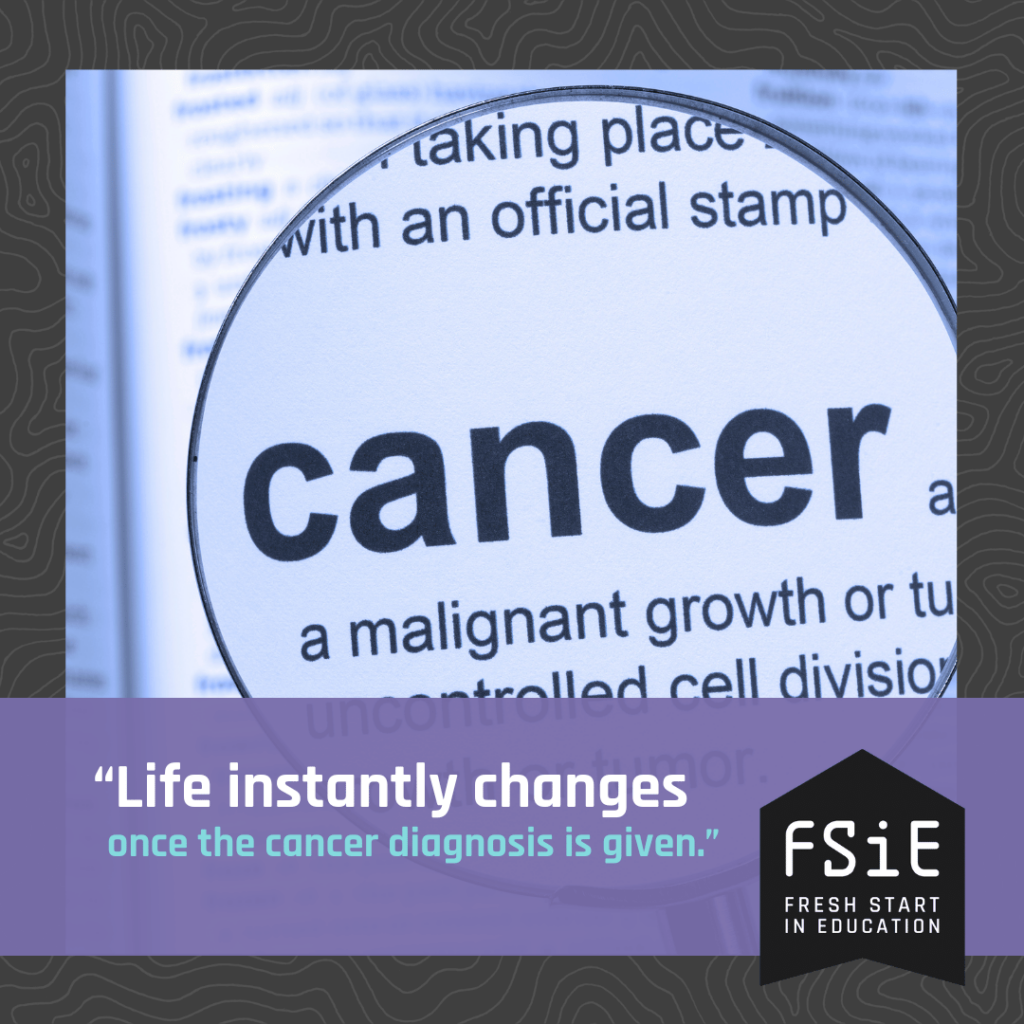
Another staging system often used is called ‘The TNM staging system,’ TNM stands for.
Using these forms of staging assists the doctors in determining the best course of treatment, if the cancer is within its initial stages, it is common to have radiotherapy or surgery to remove the cancer. When the cancer has progressed to later stages, they often use systemic treatments.
These include:
Treatment often lasts between 3- 6 months although this depends on the stage, it can unfortunately be much longer than this. For some cancers, if it has not come back after five years, the chance of it reoccurring is then smaller, so for many that fifth anniversary is something to celebrate and be thankful for.
FIGHTING CANCER, PURSUING DREAMS - "Learning with cancer is living with cancer." Share on X
How does life change after being diagnosed?
Life instantly changes once the cancer diagnosis is given, it turns everyone's world upside down and gives the family and individual a new life purpose - getting themselves or their loved one better. The reality is that as a family, you become carers, and as an individual, there is a stigma that you can’t live normally and whilst you must adapt, life is still there to be lived. Mental health is a huge factor that can be massively impacted by the diagnosis. Fear, worry, and stress are just a few of the emotions someone may feel when being diagnosed with cancer. When asking a cancer survivor, how did you feel when getting that diagnosis?
This was their response. “Initially I felt numb even though I knew it was coming. Nothing prepares you, the disbelief and shock, 'why me?' Followed by a full-speed swirl of emotions and thoughts, mostly being about my need to be here for my children then the need to fight took over. I made myself think positively about it so I could beat it. Now, looking back, it taught me so much and gave me immense strength. Being open and communicating really helped me to navigate the different emotions.” Cancer Survivor
Cancer targets one, and all are effected, it branches out and affects the loved ones too. Being someone who has experienced this myself, it's incredibly daunting watching a loved one effected by cancer and the treatment that comes hand in hand. However, I can assure anyone facing a cancer diagnosis that as a family, it brings you closer and most importantly, reminds us of what is important and what’s not.
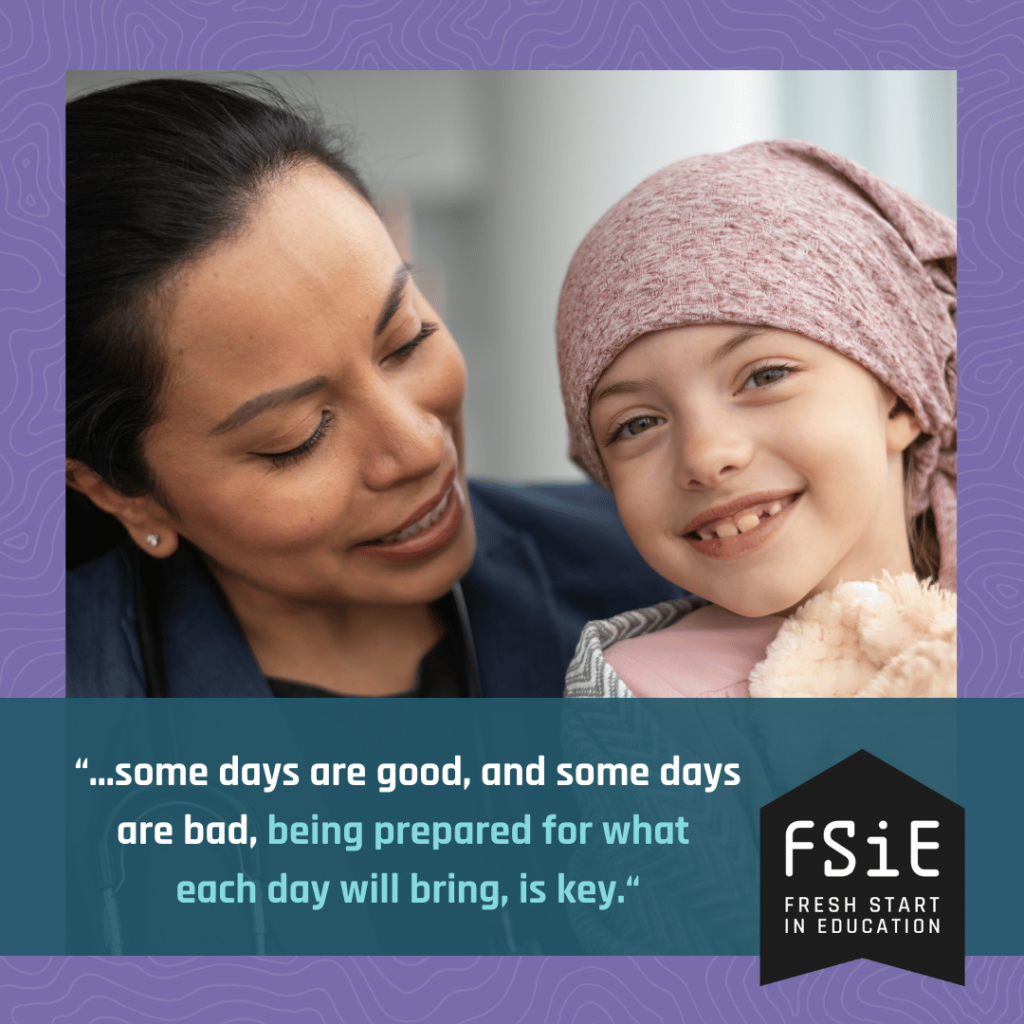
What does learning with cancer look like?
To have the power and strength to get to the stage where you’re beginning to think about education as someone effected by this disease, is quite profound. Cancer presents a myriad of obstacles to overcome, from a mental and emotional level to the physical symptoms.
Learning with cancer is living with cancer. For any person affected by this horrendous disease, it means you must adapt how you live not just for the individual but for their whole family, friends and for a young person, teachers. Learning with cancer is different for everyone, but the main components of providing education to a young person battling cancer apply to all. Adaptation, support, and empathy are the key qualities needed by an educator to ensure that all needs are met and to allow them the chance to learn.
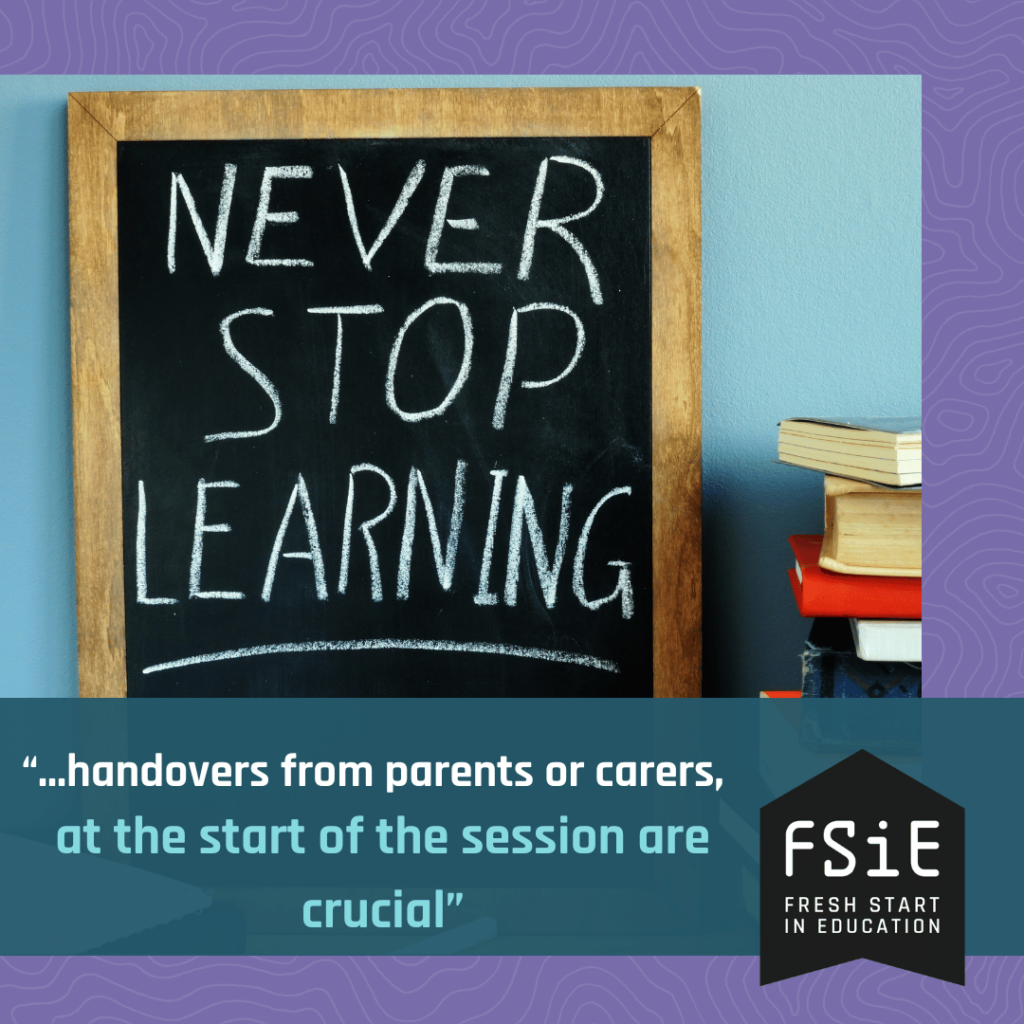
Each day is different, some days are good, and some days are bad, being prepared for what each day will bring, is key. Providing and being prepared with many different activities or lessons that are a realistic achievement for the young person, and an adaptable timetable will ensure success. Communicating well by showing them what is available to do that day and letting the young person navigate this is so important, essentially, because they will tell you how they feel, and what they can manage. Overloading someone who is subconsciously and consciously trying to fight a life-threatening illness of this nature could be detrimental to their health progression journey. From an educator's perspective teaching someone with cancer, handovers from parents or carers, at the start of the session are crucial to enable us to know how the young person has been doing and if any changes to their condition might significantly impact the course of the day. This is essential to keep them safe and cared for.
In many cases, due to immune system compromise, cancer patients are restricted from going into busy places where they could catch any form of illness e.g. flu. For a young person with cancer, this means they can’t access school. In these circumstances having someone who can go into their home and help them to learn is so positive. It lets them feel as if they aren’t missing out and the comfort of home is there for the days they aren’t feeling their best. Most importantly it gives them the time and space they require to learn at a pace that works for them.
The story of an inspirational girl:
At 5 years old, unexpectedly, a bright, beautiful, and sociable girl had the news that turned her world upside down. Delivered whilst enjoying her summer holidays, before starting school for the first time - something she’d been so excited about! Plans quickly changed when she was diagnosed. Numerous long-stay hospital visits commenced, and after time, her immune system plummeted. This prevented her from going out in public, going to school, or just enjoying life as a normal 5-year-old girl. Multiple courses of various medications followed, some of which made her feel very poorly, some of which caused some scary late-night trips to the hospital. As a result of the ongoing disease, over the past year, she had sadly lost a lot of mobility meaning she needed a wheelchair and a walking frame. But with sheer tenacity, willpower and support from professionals, is now able to walk again. She has also undergone intensive chemotherapy treatments, causing her appearance to change. This she also took in her stride, an inspiration to those around her.
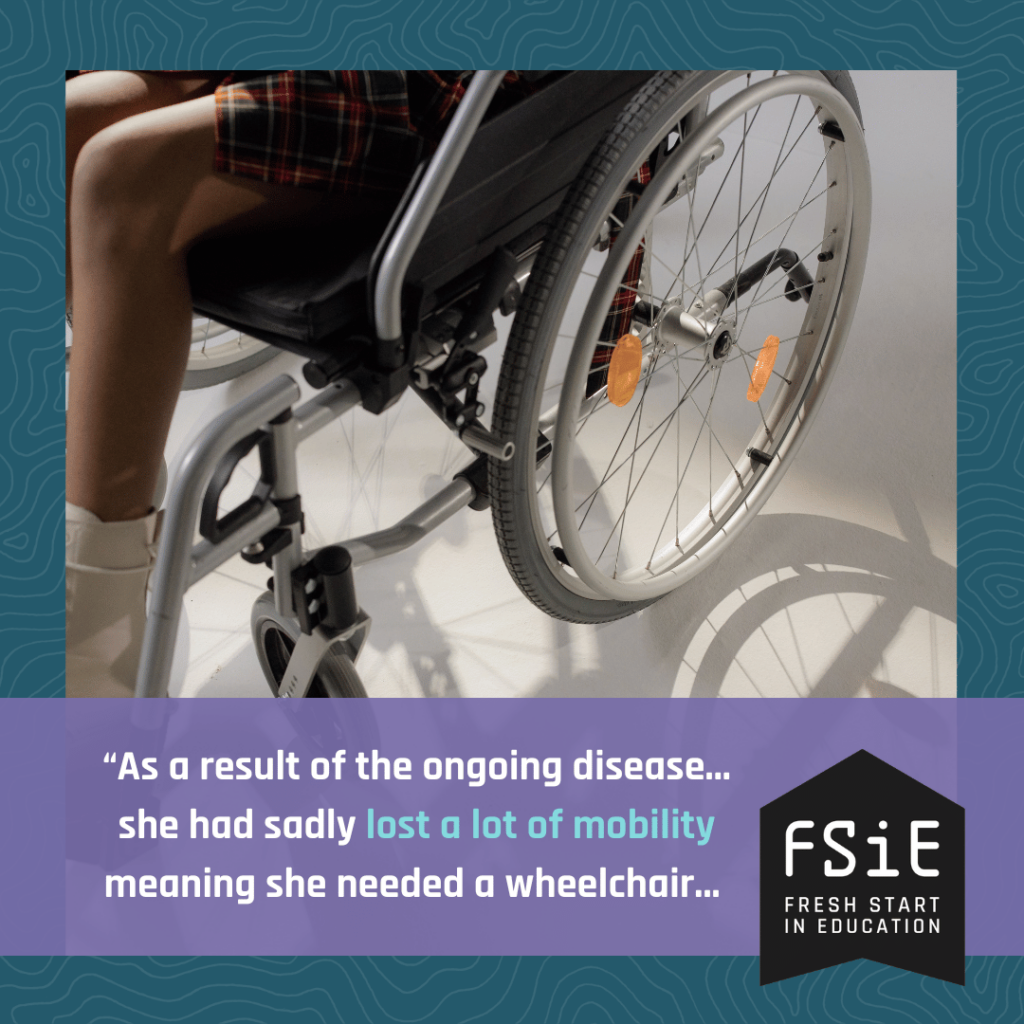
She has embraced all the change, disappointment, and hard days with the help of her loving family and has shown the true meaning of strength. Her mum rainbow-dyed her hair to try and make it a more positive experience for her, amongst many other little things the family did to guide her through it in a positive light even when they were finding it incredibly difficult themselves. Her smile continued to light up a room, along with a cracking personality – even when she was feeling unwell - she managed to put a smile on everyone’s faces. Her local community, family and friends have also gone to great lengths to make her feel special and valued throughout this challenging time.
Acts of kindness from other children, such as a gift box full of cards and drawings contributed to making the experience brighter and show that no matter what age, you can show love and kindness, and it make all the difference. Over the past year, I have marvelled daily at her strength, hope, and resilience. She has demonstrated more courage than I’ve ever witnessed before and shown it is actually possible to learn with cancer and to achieve whatever you put your heart into. A truly inspirational young person.

Life is a gift, let us not take it for granted. Let's always be grateful for what we have, value others and take time to appreciate the 'here and now.'
"When we long for life without difficulties, remind us that oaks grow strong in contrary winds and diamonds are made under pressure." – Peter Marshall
Resources for those with cancer.
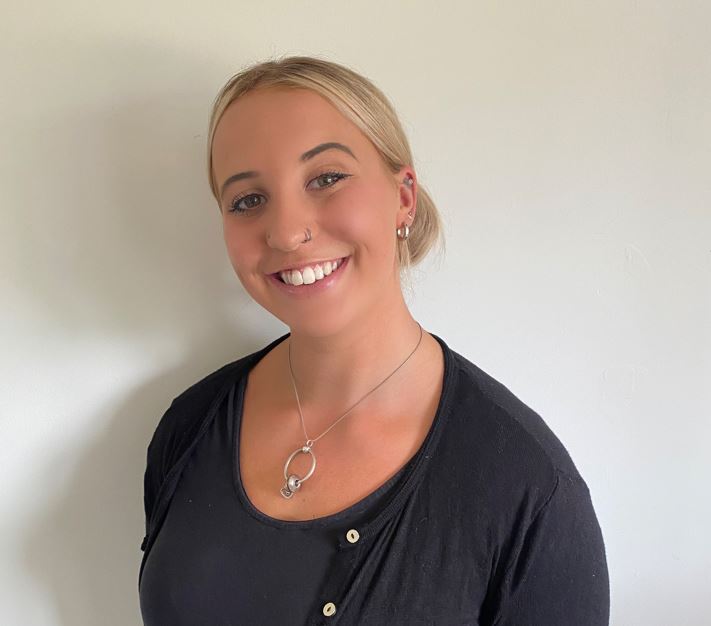
About the author
Michaela is a Staff Education Specialist and works with us at Fresh Start in Education. She has varied experience, from her time working in a residential children’s home, a SEN school, and other capacities of supporting children and young people with challenging behaviour and medical needs. Over the past 7 years, Michaela has grown tremendously in skill and knowledge and remains passionate about supporting young people to succeed and flourish.